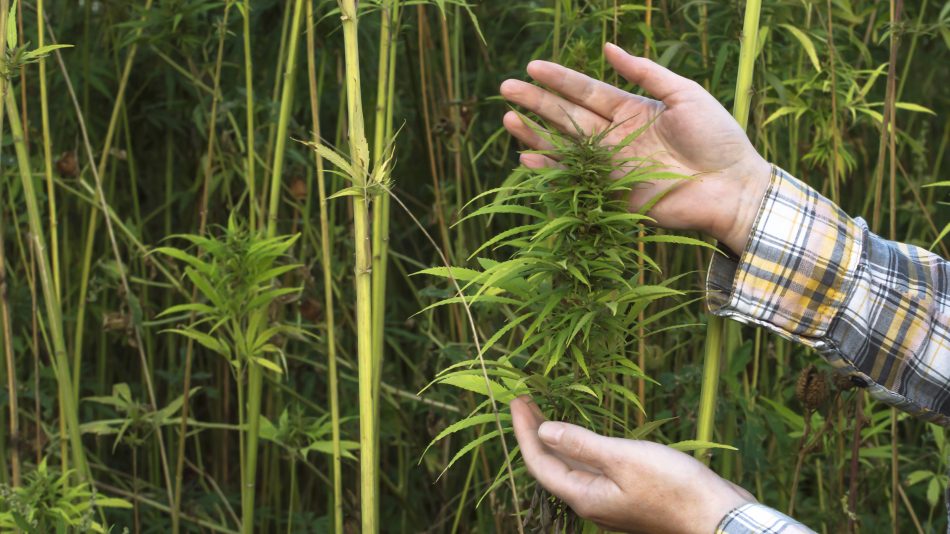
After recent changes in federal law, hemp has become a popular experimental crop for traditional and novice farmers alike. In North Carolina, the state has seen an explosive interest in the plant, but those involved in the state’s pilot program urge hemp growers and processors to be cautious.
North Carolina, along with 40 other states, recently legalized hemp cultivation after revisions to the 2014 and 2018 farm bills. The state’s Department of Agriculture and Consumer Services created a pilot program in 2017 to test the possibilities of a hemp market.
Hemp is the cannabis plant, just like marijuana, except it has lower levels of THC and cannot be smoked to get high. Hemp has many uses, but so far, one has dominated the pilot program.
North Carolina State University Associate Professor and Extension Specialist Jeanine Davis said. “When the pilot program started, we thought that there would be a lot of interest in growing for grain and fiber, and that’s turned out to not be the case,” North Carolina State University Associate Professor and Extension Specialist Jeanine Davis said. The majority of the interest right now is in producing CBD.”
CBD is cannabidiol, a compound found in the floral parts of the plant, is extracted from the flowers and can be used for therapeutic purposes. It’s often sold as oil or gummies and is used to relieve stress, anxiety, pain, and seizures, though the Food and Drug Administration is drafting rules about the health claims CBD sellers can make.
“The CBD market is absolutely exploding in the state,” said John Ivey, a research specialist at North Carolina A&T University.
NC State and NC A&T have research programs to learn more about hemp: How to grow it in peak conditions in North Carolina, its possible uses, and how to keep it below the legal THC limit. If any grower’s plants are tested and found to exceed the 0.3 percent THC limit, they must be destroyed and the grower is not compensated for the loss. Often, growers won’t know exactly how much THC their cannabis contains until it’s tested, and about 10 percent of the tested crops are “hot” and destroyed, Davis said.
Yet, despite the financial risks, the pilot program is popular. Very popular. North Carolina’s Industrial Hemp Commission noted that, as of April 2, the state had 765 licensed growers and 474 registered processors. A year ago, the pilot program only had 192 licensed growers. Those numbers would be higher, but it takes about four to six weeks for each application to be processed and approved.
In western North Carolina, hemp’s presence is spreading, with growers or processors popping up in Asheville, Franklin, Silva, Waynesville, Hendersonville, Hickory, and Marion, among other towns and cities.
Hemp growers come from “all across the board,” Davis said. Traditional farmers, smaller niche and organic farmers, and novice farmers have flocked to the plant. Some see a profit opportunity, some want to grow different crops, and some want to gain experience with hemp in case North Carolina legalizes medicinal or recreational marijuana.
“There’s people that are always willing to try something new. Folks just are looking for ways to diversify their farms so they’re not so dependent on the particular crops they are. There’s so much change taking place in agriculture right now on a national and being impacted on an international level,” Davis said.
North Carolina isn’t alone in exploring the possibilities of hemp. Unsurprisingly, Colorado and Oregon have the largest and third-largest industrial hemp crop with 9,700 acres and 3,469 acres, respectively, as of 2017, but Kentucky (3,100 acres) has the second-largest, according to a 2018 report from the Congressional Research Service (CRS). Kentucky developed a hemp pilot program early and has been a source of knowledge for North Carolina’s program. As of April, North Carolina has overtaken Colorado’s 2017 figure, with 9,121 licensed acres.
With the number of growers and acreage increasing, CBD may not stay dominant. As more data is collected on the best growing conditions in North Carolina, the CBD market could become less profitable and other uses more so. Or the number of growers could outpace the number of buyers for hemp products. Ivey raised the possibility of too many states greenlighting industrial hemp and causing a supply glut that lowers prices—and profits. The hemp boom could quickly become a bust.
Those hypotheticals are hard to test because the size of the market remains unknown. “No official estimates are available of the value of U.S. sales of hemp-based products,” Renée Johnson wrote in the CRS hemp report.

The market is growing, however. Hemp imports went from $5.7 million in 2005 to $67.3 million in 2017, driven by hemp seeds and fibers, Johnson wrote, and the Hemp Industries Association, a trade group that promotes hemp, estimated retail sales at about $700 million in 2016. Whether those numbers are predictive of the future, or even accurate, falls on individual researchers and farmers to decide.
This lack of trustworthy knowledge plagues the hemp industry, from growing it to processing it to selling it. The uncertainty is so great that researchers are reluctant to even offer a guess about the size or profitability of a hemp market for fear of misleading the public.
“It’s a fledgling industry, it’s a new industry, and we all have a lot to learn with this crop. And so there are a lot of expectations, and very high expectations, around what hemp can be and what hemp can do,” said Sandy Stewart, the vice chair of the Industrial Hemp Commission and the assistant commissioner of agriculture for the North Carolina Department of Agriculture and Consumer Services. “A lot of those expectations may become a reality, but we all need to remember that it’s still a very young industry.”
The researchers involved in university hemp programs caution growers not to invest any money they can’t afford to lose.
“It is a crop like any other crop. It does need to be managed. If you’re gonna grow it to make money off of, we’re gonna have to figure out the best varieties to grow, how to fertilize it, space it,” Davis said. “We’re gonna have to work through all these steps to do it well.”
“Don’t believe all the myths,” Ivey said. “You’re not gonna make $1 million or $500,000 off an acre. It can be a profitable crop if it’s grown correctly, if it’s grown clean and managed intensively.”
The Industrial Hemp Commission is still operating under the 2014 Farm Bill’s guidelines and is in a state of transition, Stewart said, as it adjusts to the 2018 guidelines and waits for the federal Department of Agriculture to provide updated guidelines by the end of summer.
Some legal and regulatory hurdles need to be fixed, too. The FDA needs to provide guidelines on processing hemp, and startups can struggle to get a bank loan for hemp-related activities due to federal law classifying all cannabis plants as a schedule 1 drug.
Despite the unpredictability of the hemp pilot program, though, optimism about the future is still in the minds of those involved.
“We’re considered the craft beer capital of North America. Our goal at A&T is also to become the craft bud capital of North America,” Ivey said.
Subscribe to The Patch, our newsletter, to stay up-to-date with new expatalachians articles and news from around Appalachia.
Anthony Hennen is a co-founder of expatalachians and editor/writer at the James G. Martin Center for Academic Renewal in Raleigh, North Carolina.


